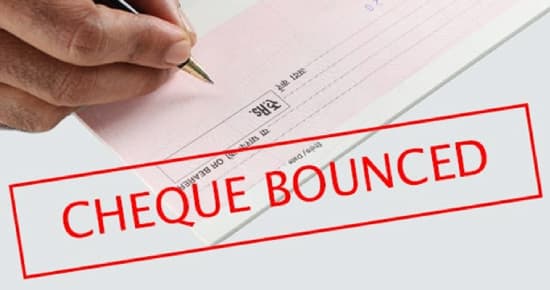Introduction
In India, a bounced or dishonoured cheque is a criminal offence, and there are legal actions that can be taken to address such a situation. Here are the steps you can take:
Legal Notice: After receiving information about the bounced cheque, the first step is to send a legal notice to the person who issued the dishonoured cheque. The notice should demand the payment of the cheque amount within a specified period of 15 days from the receipt of legal demand notice.
Wait for the Response: After sending the legal notice, you need to wait for the stipulated period of mentioned in days, as mentioned in demand notice for the issuer of the cheque to make the payment. If they fail to respond or do not make the payment within the given time, you can proceed to the next step.
File a Complaint: If the cheque issuer does not comply with the legal notice, you can file a criminal complaint under Section 138 of the Negotiable Instruments Act, 1881. This section specifically deals with the offense of dishonour of a cheque for insufficiency of funds or if it exceeds the amount arranged to be paid by the drawer's account or any other reasons such as stopped payment, account closed, etc.
Jurisdiction: The complaint should be filed in the jurisdiction where the home branch of the bank of the payee is situated and where the cheque was dishonoured. It can be filed in a court of a Metropolitan Magistrate or a Judicial Magistrate of the First Class.
Court Proceedings: Once the complaint is filed, the court will issue summons to the accused. If the accused fails to appear, the court may issue a warrant. The court will then proceed with the trial.
Conviction and Penalty: If the accused is found guilty, they may be liable for punishment, which may include imprisonment for a term that may extend to two years or with a fine that may extend to twice the amount of the cheque or with both.
In India, both criminal and civil cases can be initiated simultaneously for the dishonour of a cheque. The legal provisions regarding dishonour of cheque are primarily governed by the Negotiable Instruments Act, 1881.
In what circumstances does cheque bounce amount to an offence?
In India, the dishonour of a cheque amounts to an offence under Section 138 of the Negotiable Instruments Act, 1881, when certain conditions are met. For a cheque bounce to be considered an offence, the following circumstances typically apply:
Insufficiency of Funds: The cheque is dishonoured by the bank due to insufficient funds in the drawer's account.
Exceeding Arranged Amount: The cheque amount exceeds the amount arranged to be paid by the drawer's account, but it is dishonoured.
Stop Payment: The drawer intentionally stops payment of the cheque.
Liability within Notice Period: The payee must give notice in writing to the drawer of the cheque demanding payment within 30 days of receiving information about the dishonour.
Drawer Fails to Make Payment: The drawer fails to make the payment of the cheque amount within 15 days of receiving the notice.
When these conditions are met, the drawer of the dishonoured cheque can be prosecuted under Section 138, and if found guilty, they may be subject to punishment, which may include imprisonment or a fine or both.
Whether criminal and civil both the cases can be filed simultaneously for the dishonour of cheque?
Criminal Proceedings: Criminal proceedings can be initiated under Section 138 of the Negotiable Instruments Act, which makes the dishonour of a cheque for insufficiency of funds or if it exceeds the amount arranged to be paid by the drawer's account a criminal offence. The drawer of the dishonoured cheque can be prosecuted, and if found guilty, may be punished with imprisonment or a fine or both.
Civil Proceedings: Simultaneously, a civil suit for the recovery of the cheque amount can be initiated. This is a separate legal action from the criminal case and is aimed at recovering the amount due as a debt. The civil suit is filed in a civil court with jurisdiction over the matter.
It's common for complainants to pursue both criminal and civil remedies concurrently to expedite the recovery process and to increase the chances of getting the cheque amount. However, it's important to note that the two proceedings operate independently, and the outcome of one does not necessarily affect the other.
In what circumstances cheque bounce does not amount to an offence?
While the dishonour of a cheque is generally considered a criminal offence under Section 138 of the Negotiable Instruments Act, there are certain circumstances under which it may not amount to an offence. Here are a few scenarios:
Insufficiency of Funds: If the cheque was dishonoured due to insufficiency of funds but the drawer has made arrangements to ensure that the cheque amount is covered before the expiry of the notice period (15 days after receiving a notice of dishonour), it may not amount to an offence.
Payment Stopped by the Drawer: If the drawer stops the payment of the cheque with the valid reasons acknowledged by the payee, it might not be considered an offence. The drawer and payee may have a mutual agreement to stop the payment.
Dispute over Amount or Signature: If there is a genuine dispute regarding the amount mentioned in the cheque or if the signature on the cheque is in question, it may be a valid defence. However, this needs to be substantiated with evidence.
Non-Compliance with Legal Requirements: If the notice as per the legal requirements specified in Section 138 is not given to the drawer within the stipulated time frame of 30 days, it could impact the criminality of the act.
